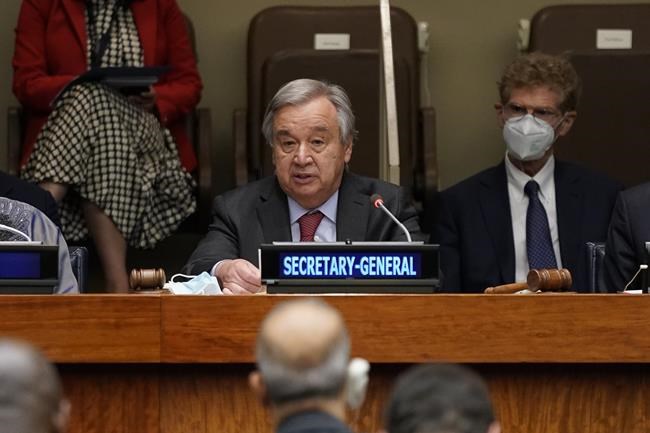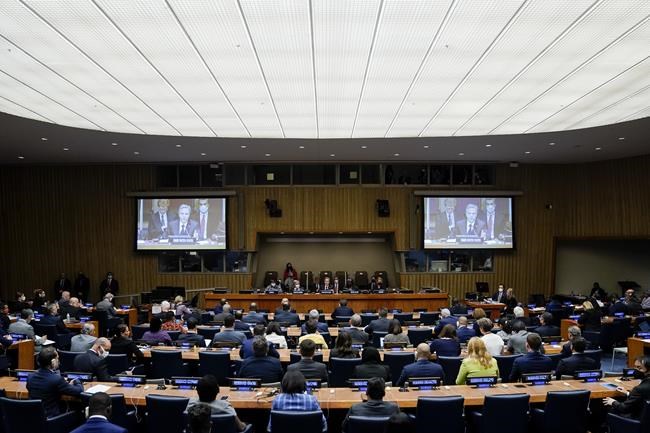UN chief `hopeful’ of Ukraine grain deal to help food crisis
Advertisement
Read this article for free:
or
Already have an account? Log in here »
To continue reading, please subscribe:
Monthly Digital Subscription
$1 per week for 24 weeks*
- Enjoy unlimited reading on winnipegfreepress.com
- Read the E-Edition, our digital replica newspaper
- Access News Break, our award-winning app
- Play interactive puzzles
*Billed as $4 plus GST every four weeks. Offer only available to new and qualified returning subscribers. Cancel any time.
Read unlimited articles for free today:
or
Already have an account? Log in here »
Hey there, time traveller!
This article was published 18/05/2022 (988 days ago), so information in it may no longer be current.
UNITED NATIONS (AP) — With global hunger levels at a new high, the United Nations chief said Wednesday he is in “intense contacts” with Russia and other key countries and is “hopeful” of an agreement to allow the export of grain stored in Ukrainian ports and ensure Russian food and fertilizer have unrestricted access to global markets.
But Secretary-General Antonio Guterres told a ministerial meeting on the escalating food security crisis, which has been exacerbated by the war in Ukraine, that “there is still a long way to go.”
“The complex security, economic and financial implications require goodwill on all sides for a package deal to be reached,” he said of his discussions with Moscow, Ukraine, Turkey, the U.S., the European Union and others. “I will not go into details because public statements could undermine the chances of success.”

Guterres said global hunger levels “are at a new high,” with the number of people facing severe food insecurity doubling in just two years from 135 million before the pandemic to 276 million today. He said more than 500,000 people are living in famine conditions — an increase of more than 500% since 2016.
He said Ukraine and Russia together produce almost a third of the world’s wheat and barley and half of its sunflower oil, while Russia and its ally Belarus are the world’s number two and three producers of potash, a key ingredient of fertilizer.
“There is no effective solution to the food crisis without reintegrating Ukraine’s food production, as well as the food and fertilizer produced by Russia and Belarus, into world markets, despite the war,” he said.
The secretary-general said Russia’s invasion of Ukraine on Feb. 24 is “amplifying and accelerating” the drivers of food insecurity and global hunger — climate change, COVID-19 and inequality.
The conflict has closed Ukraine’s Black Sea ports, halting food exports to many developing countries, Guterres said that during his recent visit to Africa’s Sahel region, he met families who didn’t know where their next meal was coming from.
David Beasley, head of the U.N. World Food Program, warned that “failure to open the ports will be a declaration of war on global food security, resulting in famine and destabilization of nations as well as mass migration by necessity.”
“This is not just about Ukraine,” he said. “This is about the poorest of the poor around the world who are on the brink of starvation as we speak. So I ask (Russian) President (Vladimir) Putin, if you have any heart at all, to please open these ports … so that we can feed the poorest of the poor and avert famine, as we’ve done in the past, when nations in this room have stepped up together.”
Turkey’s foreign minister, Mevlüt Çavuşoğlu, said his country supports the secretary-general’s efforts to establish humanitarian corridors to ensure food security.
“Together will the U.N. we are working to ensure the safe passage of Ukrainian ships carrying grain,” he said. “We are working to establish a contact group on all these humanitarian issues.”
U.S. Secretary of State Antony Blinken, who chaired the meeting called by the United States, said the world is facing “the greatest global food security crisis of our time.”

Blinken said that between 2016 and 2021, the number of people living in acute food insecurity — where their inability to eat adequate food puts their lives or livelihoods “in immediate danger” — skyrocketed from 108 million to 161 million.
America’s top diplomat urged countries make significant new contributions for humanitarian organizations and agencies battling food insecurity, and he called on countries with significant grain and fertilizer reserves to also come forward quickly.
“Governments and international organizations can also come together to compel the Russian Federation to create corridors so that food and other vital supplies can safely leave Ukraine by land or by sea,” Blinken said. “There are an estimated 22 million tons of grain sitting in silos in Ukraine right now, food that could immediately go toward helping those in need if it can simply get out of the country.”
Blinken said the U.S. had announced more than $2.3 billion for emergency food assistance since the Russian invasion and added $215 million more Wednesday, He said the Biden administration expects Congress to approve about $5.5 billion in additional funding for humanitarian aid and food security very soon.
German Foreign Minister Annalena Baerbock said: “Russia is not only leading its brutal war with tanks, missiles and bombs. Russia is leading this war with another terrible but more silent weapon: hunger and deprivation.”
“By blocking Ukrainian ports, by destroying silos, streets and railroads, and especially farmers’ fields, Russia has launched a grain war, stoking a global food crisis,” she said.


